|
|
|
Sort Order |
|
|
|
Items / Page
|
|
|
|
|
|
|
| Srl | Item |
| 1 |
ID:
164296
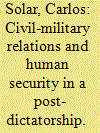

|
|
|
|
|
| Summary/Abstract |
This article explores current developments in Chile, where since the return to democracy in 1990, the elected authorities have reconfigured the nation’s military resources in favour of four action pillars: peacekeeping and international conflict management, landmine removal and gun disarmament, emergency and catastrophe response, and a concern for human, economic and social rights. Successive defence policies offer a valuable case study for exploring the trade-offs between security, traditional and non-traditional threat management and institutional capabilities. The article argues that human security policymaking is not free from undesired outcomes; specifically, regarding how to reconvene the role of the armed forces when conventional war seems a thing of the past. The paper focuses on the interagency policy implications and the challenges ahead for civilians and the military.
|
|
|
|
|
|
|
|
|
|
|
|
|
|
|
|
| 2 |
ID:
164289
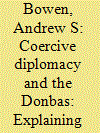

|
|
|
|
|
| Summary/Abstract |
What were Russia’s objectives in Eastern Ukraine, and why was it seemingly unable to achieve a successful or decisive outcome? In contrast to Russia’s seizure of Crimea, the uprising in Eastern Ukraine was marked by disorganization and chaos. Using proxy and surrogate actors, along with military exercises and the injection of Russian troops, Russia sought to institutionalize a political entity inside Ukraine to influence its domestic politics. In this article, I analyze the mechanisms by which Russia attempted to implement, and later salvage, its strategy. The article contributes to clearer theoretical and practical understanding of limited force in coercive diplomacy, signaling, and a more rigorous treatment of the role and uses of proxy actors.
|
|
|
|
|
|
|
|
|
|
|
|
|
|
|
|
| 3 |
ID:
164294
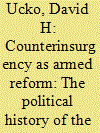

|
|
|
|
|
| Summary/Abstract |
Despite the emphasis in doctrine and academia that counterinsurgency is in its essence political, these operations are all too commonly discussed and approached as primarily military endeavors. Informed by the need to refocus counterinsurgency studies, this article revisits a foundational case of the canon – the Malayan Emergency – to discuss its political (i.e., not military) unfolding. The analysis distinguishes itself by emphasizing the diplomatic processes, negotiations, and deals that gave strategic meaning to the military operations underway. In so doing, the article also generates insight on the use of leverage and elite bargains in creating new political settlements and bringing insurgent conflicts to an end.
|
|
|
|
|
|
|
|
|
|
|
|
|
|
|
|
| 4 |
ID:
164295


|
|
|
|
|
| Summary/Abstract |
This article examines the domestic causes of the Iran–Iraq War. It delves into secret discussions among Iranian political and military elites during the conflict, their analyses of their own performance on the battlefield, and their revealing public disputes and blame game decades later. It contends that an underexplored and yet critical driving force behind Iran’s prosecution of the war was factional politics. Along with state-level geo-strategic, regime-level security and individual-level ideological concerns, factional factors must also be examined to understand Tehran's war-time decisions. Iran’s factional rivalries began between the Islamists and the nationalists; and between the Islamic Revolutionary Guard Corps (IRGC) and the army at war’s outbreak, and eventually penetrated into the heart of the Islamist camp between the militant clerics and the IRGC.
|
|
|
|
|
|
|
|
|
|
|
|
|
|
|
|
| 5 |
ID:
164297
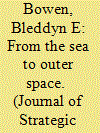

|
|
|
|
|
| Summary/Abstract |
Colin Gray once lamented the absence of a ‘Mahan for the final frontier’ and spacepower theory in strategic studies. This article proposes the command of space as the fundamental concept of spacepower theory, and that Mahan himself has much to offer in the endeavour of spacepower theory-making than has hitherto been realised. The theory is advanced by tempering versions of the ‘command of space’, stressing its educational intent, and explaining the nuanced sub-concepts of space control and denial through understanding some precedents set by seapower theory. In the process, aspects of Mahanian and Corbettian seapower theory are unified.
|
|
|
|
|
|
|
|
|
|
|
|
|
|
|
|
| 6 |
ID:
164293


|
|
|
|
|
| Summary/Abstract |
Military capacity building (MCB) is as problematic as it is ubiquitous, with the British experience in Sierra Leone providing a rare example of ostensible success. This article critiques the dominant conceptualisation of MCB as purely a principal–agent (PA) problem, using military change scholarship to examine the impact of wartime British intervention on the Sierra Leonean armed forces. Here, indigenous military change was both externally driven and fundamentally adaptive in nature, allowing MCB to bypass some of the difficulties predicted by PA models. However, this adaptive approach nonetheless failed to reconcile Western military values with prevailing Sierra Leonean culture, complicating post-war stabilisation efforts.
|
|
|
|
|
|
|
|
|
|
|
|
|
|
|
|
| 7 |
ID:
164290
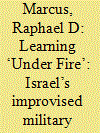

|
|
|
|
|
| Summary/Abstract |
What organisational attributes enhance a military’s ability to effectively adapt on the battlefield? Upon the outbreak of war in July 2014 between Israel and the Palestinian militant group Hamas, the Israel Defense Forces (IDF) encountered an expansive network of tunnels from which Hamas was launching large-scale assaults into Israel. This article illustrates that the IDF’s ability to successfully adapt ‘under fire’ to this battlefield surprise was facilitated by several important attributes related to its organisational learning capacity: a dynamic, action-oriented organisational culture, a flexible leadership and command style, specialised commando units which acted as ‘incubators’ for learning and innovation, and a formal system to institutionalise and disseminate lessons learned.
|
|
|
|
|
|
|
|
|
|
|
|
|
|
|
|
| 8 |
ID:
164292


|
|
|
|
|
| Summary/Abstract |
This article examines the historical impact of foreign fighters and how the international community has sought to counter this threat. It argues that foreign fighters have contributed significantly to the metastasis of Salafi-jihadism over the past 30 years. They have globalized local conflicts. They have brought advanced skills to battlefields. Further, the logistics infrastructure built by foreign fighters has allowed Salafi-jihadism to expand rapidly. The challenge for security officials today is how to prevent the foreign fighters in Syria and Iraq from expanding the threat of Salafi-jihadism further. To inform this effort, this article derives lessons learned from past efforts against Arab Afghans in Bosnia (1992–1995) and Abu Musab al-Zarqawi’s foreign volunteers in Iraq (2003–2008).
|
|
|
|
|
|
|
|
|
|
|
|
|
|
|
|
| 9 |
ID:
164291
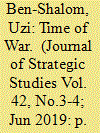

|
|
|
|
|
| Summary/Abstract |
This paper explores the construction of combat motivation in the Israel Defense Forces (IDF), arguing that although Israeli society at large is in a ‘Post Heroic’ era, the ‘Heroic Spirit’ is revealed during emergencies. A total of 1535 questionnaires were administered among combat soldiers during large-scale operations fought during national emergency and during small-scale routine operations. The results reveal differences in the construction of combat motivation typical for emergency vs. routine, as well as for reserves vs. regular units. These results indicate that the Post Heroic era is a condition that could be shifted according to cultural, organisational and individual determinants. This paper discusses the roots of these constructions and their implications on the theory of combat motivation and combat experience.
|
|
|
|
|
|
|
|
|
|
|
|
|
|
|
|
|
|
|
|
|